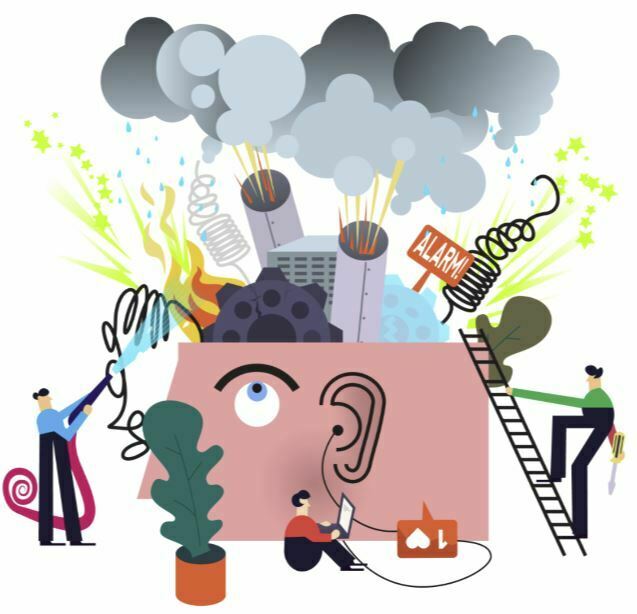What is Borderline Personality Disorder (BPD)?
People with borderline personality disorder (BPD) show a pattern of extreme mood swings, emotional outbursts and erratic behaviours which leads to a life which is permanently on the edge of disruption and conflict. They usually fail to realise the damaging effects their emotions and reactions can have and do not recognise the harm they are doing to those around them. Living with someone with BPD is tremendously stressful and can combine a sense both of being held hostage and of being about to be abandoned. At the same time as feeling desperately needed by your partner, you may also feel resented, threatened or even hated by them. Their emotional fragility, which usually includes threats of self harm or suicide if you withdraw your support, makes it very difficult for you to leave them. Sometimes you may feel seriously in danger of assault, or actually be assaulted but taking steps to change the situation may feel impossible.
The origin of BPD usually lies in childhood trauma, such as physical, emotional or sexual abuse or neglect. These dreadful, traumatic experiences, early in life, prompt the individual to learn ways of coping which can last a lifetime. As what they have to learn is how to cope with these appalling early relationships, the things they learn (such as extreme ways to control or manipulate those close to them) are not suited to healthy, normal relationships. The victim of childhood abuse or neglect is often doomed to years of difficult life, experiencing distorted patterns of emotion and behaviour which make normal relationships impossible. Although problems tend to settle down slowly over the years they do not do so quickly, so that massive problems tend to persist for years for the individual and those around them.
My husband has Borderline Personality Disorder
Due to its early origins, BPD emerges early in life and is usually apparent by late teens and early twenties. It is therefore very likely that, as a partner, you will have seen many warning signs. However, you may have felt that you can help or rescue your partner through your support and affection, which is often what pulls someone into a relationship with a BPD sufferer. Having become the person’s supporter, it may then have become emotionally even more difficult to leave them because of threats of self harm or suicide. A wish to reassure your partner that you want to help them may then lead to you deciding to marry them as a sign of your commitment.
Unfortunately reassurance, encouragement and even unconditional love are not effective in changing the behaviour of someone with BPD but simply encourage their dependence. Marriage locks you into the relationship on a more formal, legal basis and makes escape even more difficult.
Worse still, if you have children with a partner who suffers from BPD, you run the risk of harming your own children by exposure to the emotionally or even physically damaging behaviour of your partner. Seeing you suffering emotional or physical abuse is, in itself, very harmful to children but having a parent who is emotionally unstable is directly harmful to children as well. People with BPD do not make good parents. If you are unable to separate from a partner with BPD, to protect your children from this harm, you may find that social services get involved and take steps to place your children in care.
What can I do?
You cannot expect to change the behaviour of someone with BPD yourself. Therapy is difficult and prolonged and requires a lot of training. Further, most people with BPD are very reluctant to get help and unfortunately those that do get referred for help find it very hard to engage properly and to benefit. Mostly change only occurs over many years through the passage of time.
Nevertheless, there are treatment programmes available from specialist centres and if your partner can get referred and then engages with therapy, it may be reasonable to persist, with specialist help, in trying to get your relationship to work.
If specialist therapy for your partner is not an option, either because you can’t get a referral or because the situation is so bad that you cannot wait, then the person who needs help will be you.
Start to keep a record of events
Clearly something, probably the sense that your partner’s life depends on you staying with them, is keeping you in the relationship. The only thing likely to help you is to come to understand how you are being manipulated and trapped so that you can take effective steps to bring about change. A good starting point for you, so that you can help yourself to understand how your relationship works, is to keep a record of the incidents that occur - what triggered them, what happened, how they ended. Notice the sequence of events - who does or says what. If you have children, take careful note of what happens to them and how they react. The exercise of writing down what happens will help you to take a more rational approach to your situation rather than being overwhelmed by the emotion and stress of it.
The ONRECORD evidence-gathering app is a great way to record and store this kind of information in a structured and organised way. As a mobile app it will always be accessible and your records are stored securely online. By steadily recording events you will build a picture of how patterns of behaviour develop and what triggers them so that you can properly understand it yourself. You will also have a crucial record which you can share with a therapist or counsellor to ensure that they fully understand your situation and can help you to review it rationally. We would definitely recommend using the ONRECORD app as an effective tool in dealing with a husband who has BPD.
Seek a referral for counselling or psychotherapy for yourself
Counselling is an opportunity to share your situation frankly in a way that is usually impossible with family or friends. A counsellor cannot tell you what to do but they can prompt you to express your thoughts and feelings so that you can take a more dispassionate view of your circumstances and your options. Sharing your experience with a counsellor by linking your ONRECORD records with them will give them a clear picture of your experience and will help them to ask key questions and to challenge you where necessary. Counselling has the advantage over psychotherapy of being cheaper and more available and, with the right person, may be just what you need.
If you find that your problems are too complex for a counsellor to take on, then skilled psychotherapy from a psychologist or psychiatrist is the next option. I strongly recommend a cognitive behavioural approach. Cognitive behaviour therapy involves helping you to understand the thoughts and feelings which underlie your responses to your partner and, from that insight, learning to respond differently in a way which improves your situation. Record keeping using ONRECORD will be extremely valuable for this process as it would be in counselling and we again strongly recommend it. While this kind of therapy is available on the NHS, waiting times tend to be long and you may struggle to persuade your GP to refer you. Private skilled psychological help is readily available but make sure the person you see is fully qualified and has been trained in a reputable teaching centre.


